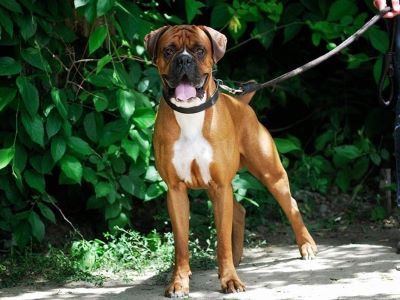Boxers are energetic dogs that need plenty of activity. They guard their family and sometimes become possessive over toys, food, or other things they think belong to them. These loyal dogs are caring for their family members. But then “Why boxers are the worst dogs?“
In this article, we are going to learn about the behaviour of this dog and how can we handle it better as responsible pet parents. So, without further ado let’s dive into the dog world…

Why Boxers Are the Worst Dogs?
Boxers are very active dogs. They want to protect their family and everything that they have. While loving at home if given enough exercise, attention, and training, Boxers can also be stubborn.
Their strong personality is a big responsibility. But for an active person able to invest the necessary time and effort, a Boxer can become a wonderful friend.
They might question authority or attempt to test boundaries, requiring a firm but positive approach in training. Early training and socializing are important so they can learn to behave properly around others.
Instead of seeing this as a negative side, embracing this patiently helps them in training and activities that can turn this into a positive aspect, showcasing the boxer’s brilliance and individuality. Let’s look at their characteristics in detail:
1. Independence and Strong Will
Boxers are known for their independence and strong will. Stopping from their history as working dogs, they may display a level of stubbornness.

Boxer’s pet parents often find success by employing constant, positive reinforcement techniques to train and direct their dog’s strong will effectively.
2. High Exercise Needs
Boxers are full of energy, they require regular regular and active exercise to maintain their well-being. A daily routine of walks runs, and engaging playtime is crucial to prevent boredom and destructive behaviour.
For this, they need owners who embrace an active lifestyle, as they are high-level energy breeds.
Owners should provide not only physical exercise but also mental stimulation through interactive toys, training sessions, and engaging activities. A well-exercised boxer is a happy and healthy dog[1].
3. Curiosity and Exploratory Nature
Boxers are born curious and they love to explore. Their playful nature may lead them to explore their surroundings, sometimes getting into everything within their reach.
Pet parents need to create a safe environment, keep harmful items out of their reach, and always supervise their playtime.

4. Vocalization (Barking)
Boxers are expressive and known for their barking, often barking to express various emotions or when they feel something strange.
While this thing can make them excellent watchdogs, pet parents need to provide consistent training to manage excessive barking. Positive reinforcement techniques can be employed to encourage desired behaviours and discourage unnecessary barking.
5. Shedding
Boxers have a mild shedding rate, and regular grooming is essential to keep their coat healthy. Brushing not only helps control shedding but also promotes bonding between you and your boxer.
Also, grooming sessions allow for the early detection of any skin issues and treating them effectively.
6. Lap Dog Tendencies
Despite their size, boxers may show lap dog tendencies. They are known to seek close physical contact with their humans, craving affection and warmth.
This charming quality makes them excellent family pets, but owners must set boundaries and establish a balance between cuddle time and independent play.
7. Attention and Affection
Boxers blossom on attention and affection. They form strong bonds with their human family members and may experience separation anxiety if left alone for extended periods.
Regular interaction, playtime, and positive reinforcement for good behaviour contribute to a happy and emotionally happy boxer.
8. Training Challenges
Boxers can be training challenges due to their independent nature and strong will. While intelligent and capable of learning various commands.

Consistent and positive training methods, with patience, are crucial. Boxers respond well to rewards and praise, making training sessions an opportunity for bonding.
9. Jumping Behavior
Boxers are known for their energy, and this can be displayed as jumping behaviour, especially when they greet people.
While it showcases their friendly and playful nature, it’s important to address this behaviour through training. Teaching options like sitting or offering a paw for a handshake help channel their spirit in a more controlled and polite way.
10. Territorial Instincts
Boxers protect their family and home. This makes them good guard dogs. But owners need to socialize them starting at a young age.
Socializing means letting the Boxers safely spend time around different people, locations, and activities. It helps the Boxers learn when to guard and when there is no danger.
With socializing, the Boxers can control their wish to defend their family and house. They will know what is an actual threat versus normal situations. Socializing saves the Boxers from always acting territorial. It helps their instincts match real risks better.
11. Regular Grooming
Even though Boxers have less fur, they need lots of grooming. You must brush them regularly. Brushing reduces shedding and keeps the fur healthy. You also need to check and clean the Boxers’ ears.

Trimming their nails and caring for their teeth are important too. Grooming helps the Boxers stay clean and healthy. It also lets owners spot any new lumps, skin issues, or other problems.
So grooming is about more than just looks, it helps the Boxers feel good and live longer. It’s a helpful routine for both the dog and the owner.
12. Health Concerns
Boxers can have some health problems that many dogs don’t get. Some issues to watch out for are heart disease, hip problems, and certain cancers.
Since these crop up in Boxers more than other breeds, checkups at the vet are very important. Boxer owners should learn about what health troubles their type of dog may face. That way they can catch issues early and help their dog feel better faster.
Working closely with the vet and creating a good plan for diet and exercise helps keep Boxers robust.
Keeping up with special care due to the breed’s common risks contributes to a Boxer leading a happy, energetic life for years to come. So regular vet visits, the right food, and plenty of activity help Boxers stay sturdy over time.

13. Maintenance Costs
Boxers cost more to care for than some other dogs. Food, vet bills, grooming, training, it adds up. People should know that before they get a Boxer. Planning for costs allows Boxer owners to give great care.
Vet’s fees for checkups and if issues come up can take big chunks of money over time. Add in brushing tools, nutritious chow, toys and aids for training, and supplements…it is no low-budget pet. However, understanding the expenses expected of the breed makes budgeting realistic.
FAQs
1. Are Boxer Dogs Aggressive?
Boxers can be friendly and gentle companions who welcome new friends and are kind towards children. However, boxers are high-energy dogs who require plenty of exercise to remain calm. Without exercise, they may become hyper or aggressive.
2. Why Boxers Are the Worst Dogs?
Most Boxer aggression problems can often be traced back to sub-par training as puppies. Other causes of aggression can include the dog dealing with pain or discomfort. These dogs are also extremely active, and if they are not given adequate exercise, they may misbehave.
3. What Is a Boxer’s Lifespan?
This fact alone of being a large-sized dog cuts down on the expected life span. However, added to this is the fact that cancer is the leading cause of death in this breed. This makes the average Boxer life span between 9 and 12 years, which is considered relatively short.
4. What Is the Shortest Lifespan Dog Breed?
On average, the dog breed that lives the shortest is the Dogue de Bordeaux, also known as the Bordeaux Mastiff. This breed has a life expectancy of around 5-8 years.
5. Which Dog Can Live 20 Years?
Yorkshire terriers, Chihuahuas, Dachshunds, Toy Poodles and Lhasa Apsos are the breeds that typically live the longest with these averaging a lifespan of up to 20 years. This is much higher than the average lifespan of a dog which is between 10 and 13 years.
Conclusion
In conclusion “Why boxers are the worst dogs?“For the right family, Boxers can be perfect and playful.
Their silly side comes out with a fun and highly active nature. And they love family more than a TV channel called “Family!” Yes, these dogs stick to their owner’s side like glue, when not running to check house security!
Sure Boxers are…special breed indeed! But chances are, adventurous owners will adore life with this breed through and through!
While every dog breed comes with its advantages and disadvantages, the Boxer has the potential to be the best companion.
Reference:
- How much exercise does your dog need? (2021, July 26). WebMD.



